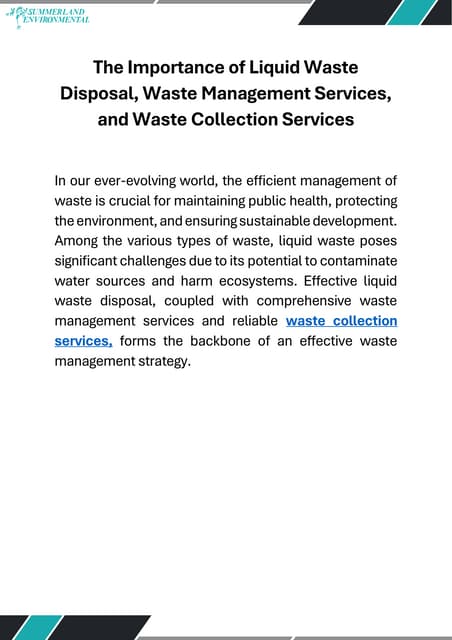Reclaim Waste Can Be Fun For Anyone
Reclaim Waste Can Be Fun For Anyone
Blog Article
Our Reclaim Waste PDFs
Table of ContentsReclaim Waste Can Be Fun For EveryoneReclaim Waste - The FactsFascination About Reclaim WasteThe Only Guide for Reclaim WasteExamine This Report on Reclaim Waste
Discover the kinds, incidents, and forms of fluid waste. Domestic sewer waste describes the waste and products from a residential sewage-disposal tank. This type of waste is created by human beings in homes, schools, and various other structures. This only includes sewage-disposal tanks that have a drain area. The appropriate administration and disposal of residential sewage waste need liquid waste to be moved to a sewage therapy plant where the proper approaches and equipment are used to purify and get rid of waste.
Industrial waste often includes possible hazards, such as combustible products or a mix of fluid and strong waste products, and requires a much more advanced and comprehensive disposal procedure. The disposal of commercial waste usually entails the filtering of waste prior to transportation to make sure safe and appropriate disposal. Hazardous waste is created from byproducts and runoff of industrial procedures and manufacturing.
This sort of waste can not use the exact same sewer monitoring transportation or processes as septic or commercial liquids. The hazardous waste management process needs the examination and screening of fluid waste before it undergoes the disposal process (liquid waste disposal). Drainage waste is the fluid waste that originates from drainage and excess stormwater in very booming locations or cities
Runoff waste can cause contamination and flooding if not handled correctly. Discover more regarding drain cleaning and waste administration. Making sure appropriate waste administration can stop catastrophes and minimize environmental harm. Both individuals in residential setups and specialists in business or production industries can benefit from recognizing the processes and policies of liquid waste management.
Reclaim Waste Fundamentals Explained
Get in touch with PROS Services today to discover our waste management and disposal services and the appropriate methods to take care of the fluid waste you create.
(https://reclaimwaste1.start.page)Do you understand what happens to your water when you disengage, purge the bathroom or drain the washing equipment? No? Well, it deserves knowing. This so-called 'wastewater' is not just a crucial resource however, after treatment, will certainly be released to our land, rivers or the ocean. Made use of water from bathrooms, showers, bathrooms, kitchen area sinks, washings and commercial processes is called wastewater.

water utilized to cool equipment or tidy plant and devices). Stormwater, a type of wastewater, is drainage that streams from farming and urban areas such as roofs, parks, gardens, Get the facts roadways, courses and rain gutters right into stormwater drains, after rain. Stormwater streams untreated directly to neighborhood creeks or rivers, eventually reaching the sea.
Some Ideas on Reclaim Waste You Need To Know
In Queensland, the majority of wastewater is treated at sewer therapy plants. Wastewater is moved from domestic or commercial websites with a system of sewage systems and pump stations, understood as sewerage reticulation, to a sewer therapy plant.
The Division of Natural Resources recommends city governments about handling, operating and preserving sewerage systems and treatment plants. In unsewered locations, regional governments may need homeowners to set up private or home sewage treatment systems to deal with residential wastewater from toilets, kitchen areas, restrooms and laundries. The Division of Natural Resources authorises using family systems when they are verified to be effective.
Most stormwater obtains no treatment. In some brand-new class, treatment of some stormwater to get rid of trash, sand and gravel has actually begun using gross toxin traps. Wastewater therapy happens in 4 stages: Gets rid of solid issue. Larger solids, such as plastics and various other items mistakenly discharged to sewage systems, are eliminated when wastewater is travelled through displays.
Wastewater after that streams right into large storage tanks where solids work out and are gotten rid of as sludge. Oil and scum are skimmed from the surface area. Makes use of tiny living microorganisms recognizes as micro-organisms to break down and eliminate continuing to be dissolved wastes and fine fragments. Micro-organisms and wastes are incorporated in the sludge. Eliminates nitrogen and phosphorus nutrients that can cause algal flowers in our rivers and intimidate aquatic life.
Getting The Reclaim Waste To Work
Nutrient elimination is not offered at all sewage treatment plants because it needs costly specialised equipment. Clear fluid effluent created after treatment may still include disease-causing micro-organisms - industrial wastewater treatment.

This usually implies wastewater needs to be dealt with or impurities eliminated before it can be discharged to rivers. A lot of wastewater flows right into the sewage system. Under the Act, city governments carry out approvals and licences for eco pertinent activities (ERAs) entailing wastewater releases that could have a neighborhood effect. The division provides approvals and permits to Ages entailing wastewater launches that might have a local or statewide influence.
What Does Reclaim Waste Do?
Monitoring offers factual info regarding water high quality and can validate that permit problems are being satisfied. The details gotten via tracking gives the basis for making water top quality choices.
Report this page